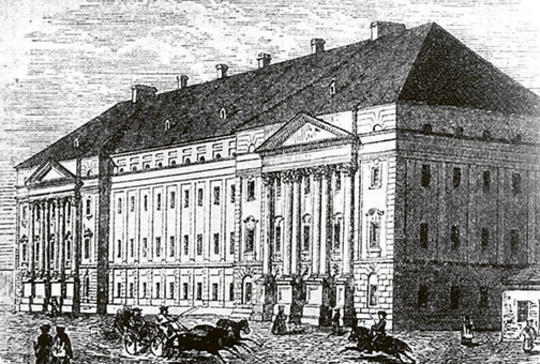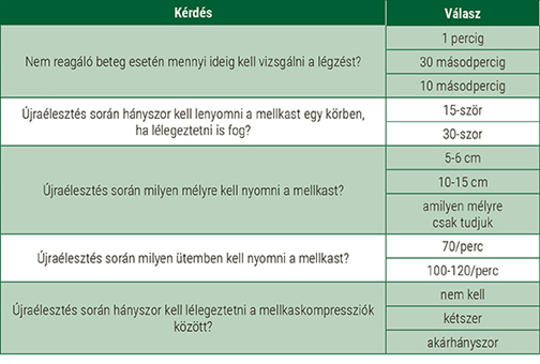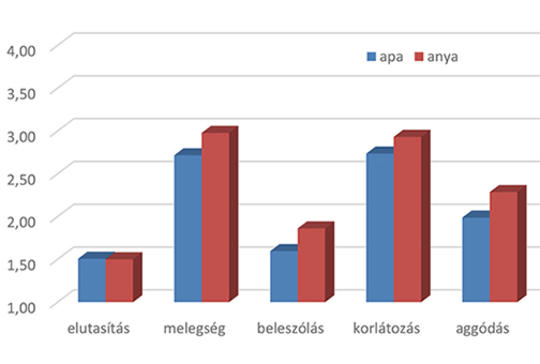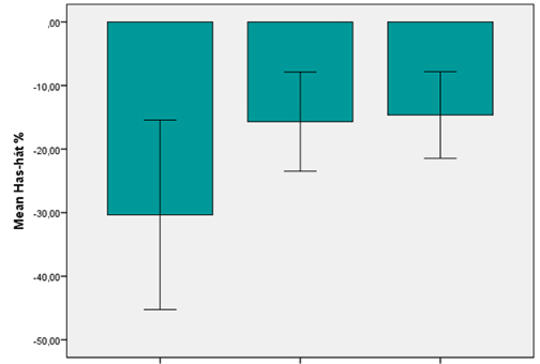The eLitMed.hu medical portal uses computer cookies for convenient operation. Detailed information can be found in the Cookie-policy.
Journal of Nursing Theory and Practice - 2020;33(3)
Content
[BLS Quality Assessment – The Effectiveness of Telephone Cardiopulmonary Resuscitation Instruction]
[The aim of the presented study is to monitor the effectiveness of BLS, to investigate its effectiveness in laymen’s groups, and to compare whether non-instructional or T-CPR is more effective. Our quantitative, cross -section study was conducted on the open day of 112 Call Center in Szombathely. The target group consisted of visiting lay people who signed a statement of consent to process their observation results (n = 19). Descriptive statistics were calculated using IBM SPSS for Windows 22.0 and Fisher-exact test and independent samples T-test (p <0.05). In the case of chest compressions, all parameters examined were more effective during manual resuscitation with telephone instruction. Without instructions, it takes an average of 12 sec. from the rescue call to start the compression, in the situation where instruction takes an average of 1 m. 25 sec. Our results suggest that T-CPR takes longer to complete chest compressions than non-instructed cases, but overall, chest compressions are more effective. ]
[Examination of Parental Treatment among Outgoing Ambulance Workers]
[The development of the family, family relations and family socialization play a decisive role in becoming an adult and in the development of later forms of behavior. Parental treatment is closely related to problem-solving skills, which is why they can influence adequate responses to unexpected situations in ambulance care. The aim of the study: to explore and analyze the parental attitudes and behaviors that emerged during the upbringing of outgoing ambulance workers and can be related to the demographic, socio-economic characteristics of the study sample, as well as work, workplace and health behaviors. The survey was conducted between the employees of the National Ambulance Service and the participants of the National Ambulance Professional Section of the HHCP. In addition to demographic, workplace, and health status questions, the authors surveyed a shortened, 23-question version of the Egna Minnen Beträffande Uppfostran (s-EMBU) questionnaire developed by Perris et al. SPSS version 25.0 was used for statistical analyses. Types of analyses included descriptive statistics, two-sample t-test, correlation calculation, analysis of variance. The authors found striking correlations between religion, especially school graduation and female gender, as well as restrictive and gay parental treatment. The maternal rejection and paternal overprotection have been shown to be prominent among people those working in the capital, with the correlation that the “diversity” provided by the big city is particularly conducive to breakaway behavior and good social relationships. The parental restriction, as one of the characteristic parental behaviors revealed in our research, and its positive relationship with religiosity and higher school graduation in the part of Emergency Medical officers who work in higher positions raises the possibility that the professional appearance of helping and life-saving activities is influenced by religiosity and the resulting development of moral and social sensitivity during upbringing. ]
[Examination of the Strength of Core- and Perineal Muscles in Case of Different Movements]
[Aims of the study: to measure the strength of core-, perineal muscles in three groups, to compare different exercises for the aspect of these muscles. 11 sedentary-, 10 women’s doing Pilates, 13 inactive female sudent’s core- and perineal muscles were measured in longitudinal study by DAVID-machine, modified Plank-test, FemiScan at Univerity of Pécs, Faculty of Health Sciences, Zalaegerszeg, 2016. february-november. Data analysis: ANOVA, Scheffe Post Hoc test, two-tailed T-test. The TS-group’s muscles became more symmetrical (p=0.043). According to Plank test, the TS-group’s 3th result became stronger than FH-group (p=0.001) and the PT-group (p=0.018) at first. About the perineal-muscles: usually the PT-group achieved the best results. The FH-group’s perineal-muscles in case of relaxation were significantly symmetrical (p=0.038) than the TS-group’s after training. Pilates-method turned out to be effective to improve the strength and stamina of core muscles. Core-training is effective to improve core muscles, but not enough for perineal muscles with the given frequency and intensity. ]
1.
Clinical Neuroscience
Is there any difference in mortality rates of atrial fibrillation detected before or after ischemic stroke?2.
Clinical Neuroscience
Factors influencing the level of stigma in Parkinson’s disease in western Turkey3.
Clinical Neuroscience
Neuropathic pain and mood disorders in earthquake survivors with peripheral nerve injuries4.
Journal of Nursing Theory and Practice
[Correlations of Sarcopenia, Frailty, Falls and Social Isolation – A Literature Review in the Light of Swedish Statistics]5.
Clinical Neuroscience
[Comparison of pain intensity measurements among patients with low-back pain]1.
Clinical Neuroscience Proceedings
[A Magyar Stroke Társaság XVIII. Kongresszusa és a Magyar Neuroszonológiai Társaság XV. Konferenciája. Absztraktfüzet]2.
3.
Journal of Nursing Theory and Practice
[A selection of the entries submitted to the literary contest "Honorable mission: the joys and challenges of our profession" ]4.
Journal of Nursing Theory and Practice
[End of Life and Palliative Care of Newborns in the Nursing Context]5.
Journal of Nursing Theory and Practice
[Aspects of Occupational Health Nursing for Incurable Patients ]






